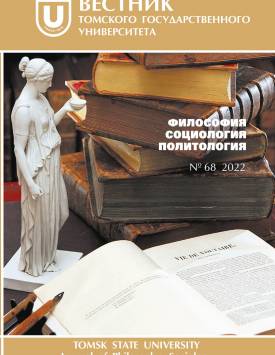Post-scholastic metamorphoses of Western European philosophical anthropology
The authors state that in its main ontological and semantic parameters philosophical anthropology dominating the discourse of modern philosophy and being taught in leading European and Russian educational institutions was developed by the ancient classics, and mainly by European Christian philosophers. It has a specific historical source -the scholastic Christian world outlook. Modern interpretations of human existence are direct or indirect consequences of solving the key question for scholasticism about the knowledge of God, which is expressed in the teachings of nominalism and realism, and predetermined the specificity of subsequent anthropological thought. In the Western philosophical and anthropological tradition, it manifests itself in three ontological characteristics - pantheism, rationalism, naturalism. The authors emphasize that rationalism was an external allembracing methodological form of scholastic thinking. The principal thing is that according to both nominalism and realism, the distinction between divine (uncreated) and created being is not made consistently: the ontological status of the connection between the human and the divine is clarified rationally. For anthropology this fact is of importance, assuming the essential, existential position of a person in his ultimate boundaries to be unclear. Nominalism declaring the theory of “two truths”, methodological dualism, ontological division assumes the faith (the basic mode of human existence) to be either in submission to reason, or as something absolutely sacred. The realistic tradition equates ontologically human thinking with the nature of God. Such an anthropological approach assumes rationalistic self-confidence, uncriticality, subjectivity, spiritual imposture, as well as pantheism, and abolishes the ontological vertical. The authors approve that the idealism of realistic philosophy provokes the flowering of a reverse anthropological position -naturalism, an evolutionary explanation of anthropogenesis with the related ideas of the human existence transitivity and its semantic picture historicity. The authors declare no conflicts of interests.
Keywords
anthropology, scholasticism, nominalism, realism, deism, pantheism, psychophysical problemAuthors
| Name | Organization | |
| Ustimenko Dmitry L. | Moscow technical University of communications and Informatics | ustimenkod2006@yandex.ru |
| Ustimenko Alexey L. | Kuban State University | ustimenko2010@rambler.ru |
References

Post-scholastic metamorphoses of Western European philosophical anthropology | Tomsk State University Journal of Philosophy, Sociology and Political Science. 2022. № 68. DOI: 10.17223/1998863X/68/16
